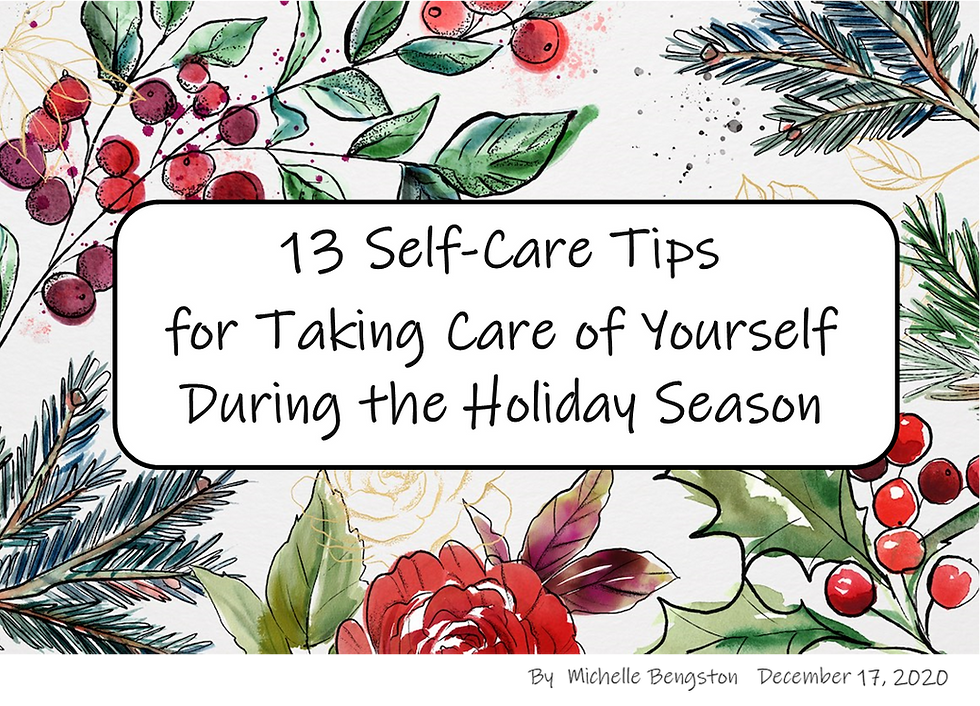How many days until Christmas......??
- The Birk Girl Blog

- Dec 4, 2022
- 7 min read
Updated: Dec 10, 2025
So, I was listening to the radio the other day and the announcer said,
"Only 21 Days left until Christmas...."
My brain paused - Really!? - Only 3 more weeks until Christmas?
Well, you know what that means, it's officially the holiday season and with all the craziness that life offers - well, EVERYTHING - the holidays just seem like another reason to stress out.
Holidays can bring many people to their knees. I too understand the holiday pressure. Not only from the "Mom" point-of-view, but also as a small business retailer.
I was searching around on the internet and found this helpful article and thought, maybe I should share. It gave me a few things to think about, but more importantly permission to think of alternatives to cope and maybe change our usual "Holiday Norm". Everybody has holiday stressors, but sometimes, I think Moms have it worse. Everyone depends on Mom to make the holidays magical, efficient and carefree - for everybody - but themselves. I'm not saying only women have these issues, but as a woman I identify with this article on a very personal level.
I know this article may not change your life, but maybe it will give you a couple suggestions to mitigate some of your holiday stress.

The holidays are always portrayed as a merry, cheerful time, yet not everyone feels that way. Many feel alone and isolated throughout the holiday season. Many people experience increased depression and anxiety during the holidays. Crisis hotlines experience an increase in number of calls, and domestic violence tends to rise.
Our memories of better days, the loss of our loved ones, and financial hardship or job instability can all add to the stress. Sometimes we have to be intentional about caring for ourselves, especially during a stressful holiday season.
While holidays tend to be a time for gathering with friends and family, the overlay of commercialism filters in adding demands on our time, energy, and resources. The added demands of the holiday season wreak havoc on our diets, on our sleep, and on our normal routines.
Many of my patients have admitted that they feel guilty even thinking about self-care. I fly frequently, and every time I do, the flight attendants give an emergency briefing about what to do in the case of an emergency. If the plane were to lose cabin pressure, an oxygen mask will drop down in front of us, and we are to put on our own oxygen mask on first before assisting others.
That goes against the nature of many. It’s part of our nature, for many of us, to take care of those around us first. Christmas is a time for giving, and in many respects, we must intentionally give to ourselves as well so that we are physically and emotionally able to give to others.
13 tips for Self-Care at Christmas
1. Give yourself permission

Give yourself permission to take care of your personal needs, permission to decline certain events, permission not to feel pressured to host events, permission not to overspend. In a very real sense, we teach people how to treat us. If we don’t give ourselves permission to do what is best for our physical and emotional well-being, others won’t either.

2. Ask yourself what would help you enjoy the holidays most.
What do you value most? What traditions are important versus those that just add stress? Getting together with certain friends who encourage you may be a better use of your time and energy expenditure than attending a company party with individuals you don’t even enjoy during the work day. Having an unusual dinner menu may be more fulfilling than the traditional Americanized holiday meal, just for the sake of tradition. Find things to look forward to that you do and will enjoy.

3. Make a plan.
When you plan ahead of time what you will do and how much time and energy you will commit, you remain in control of your circumstances and less prone to anxiety and overwhelm. If you’re concerned about being alone during the holidays, initiate plans with others in advance. You can also plan ahead for things like eating a small meal before a party so that you don’t sabotage your weight loss efforts once there. Don’t forget to also make back-up and exit plans.

4. Give yourself limits and boundaries.
Limits and boundaries let you stay engaged, but will lessen the pressure you feel, and grant yourself permission to decline some things. Make a schedule of all the events and activities you’re committed to, as well as others you’ve been invited to but don’t require a firm commitment. When you see what’s on your calendar, it makes it easier to assess what is feasible in terms of your time, energy, and resources. If you decide ahead of time that you can only realistically manage one extra event per week, then it makes it easier for you to take care of yourself and decline any additional invitations.
5. Schedule some personal time for yourself.

We are all refueled in different ways. When the holidays are stressful, it’s important that you are refueling yourself before you can reasonably expect to pour out for others. Maybe you’ll grant yourself 15 minutes a day to read a good book over a cup of coffee. Or perhaps light some candles and draw yourself a scented bubble bath at the end of a long day to relax before going to bed. Physical exercise helps restore our energy and lift our mood, so maybe you could take a walk at the park, on the beach, or along a trail while taking time to enjoy the scenery.

6. Pay attention to your senses.
When we intentionally attend to our senses, our experiences can be more rewarding. Think of different ways to include smell, hearing, sight, touch, and taste into your self-care to make you more present in the moment. When you are
out to eat or baking in your own home, take a moment to enjoy the smell of cinnamon or nutmeg. Maybe it will transport you back in your memories to a time you spent baking with your mother or girlfriend. Take a few moments to appreciate the sounds of people singing in the mall, or the choir in church. Listen carefully to the lyrics and notice how it resonates within you. Enjoy watching calm candles flicker on a table or in a window. Let it relax you as you watch. Pay attention to the feel of a soft scarf around your neck and appreciate the warmth it brings. Relish the taste of the soft, chewy home-baked cookie on your tongue. Pay attention as you chew, rather than eating mindlessly this season.
7. Do something for others.

When speaking at a large conference, a famous psychiatrist, Karl Meninger, was asked what he would suggest when someone was feeling hopeless and not sure they could go on. Most assumed that as a psychiatrist he would suggest medication or counseling. He didn’t. Instead he said, “Go out that door, cross the railroad tracks and find someone in need. Be of service to them.” He knew that when we aren’t focusing on our own misery, and are willing to help others, it does improve our mood. When you go to a party, find ways to help the host. Notice who is standing by themselves and introduce yourself. This is the time of year when volunteers are most readily needed. Find a cause you agree with and see how you can get involved.

8. Make a budget and stick to it.
One of the most stressful aspects of the holidays for many are the increased costs associated with gifts, meals, and other get togethers. The best way to approach this is to set aside a certain amount of money each month so you’ll be prepared when the extra expenses hit. Even if you haven’t done that, you can take care of yourself by setting a budget for what you can reasonably spend, and once you’ve hit that limit, you don’t go over it. You’ll thank yourself after the first of the year.

9. Plan ahead.
Don’t let yourself get caught up in the pressures and demands of the holidays. It’s important to plan ahead for those tasks or events that are a priority to you. Planning something you want to do and knowing how long it will last allows you to mentally prepare without feeling overwhelmed. For example, all malls and stores have peak shopping times. By planning what you will do in advance, you can determine to get your shopping done at less busy, and less crowded times, and maintain a sense of calm over your mind and body.

10. Try to stay as close as you can to your regular diet, exercise, sleep patterns and routine.
Do things in moderation, avoiding excessive behavior that only leads to regret (whether it’s eating, drinking, spending, or socializing). When you try to maintain your healthy habits even during the holidays, you’ll experience fewer fluctuations in mood and energy and your body will thank you for it.

11. Limit expectations of yourself and others.
Limit expectations of yourself and others, and extend grace when expectations aren’t met. William Shakespeare said, “Expectation is the root of all heartache.” I think there is some truth to this, particularly when we or others have unrealistic expectations. The truth is, there really are no perfect holidays aside from the idyllic pictures we create in our mind. Release yourself of the expectation of the perfect tree, perfect party, perfect table décor, perfect meal, and perfect gift otherwise you just set yourself up for failure.

12. Enlist support from others.
It’s not only okay, but it is advised to let others know how you’re doing so they can better understand. Consider enlisting the support of a friend, support group, counselor, or close family member. This could entail anything from asking them to text you to check on you after an event to actually accompanying you to such event. People often want to help but don’t know what will be helpful, so help them help you by letting them know what you need.

13. Have something to look forward to in the future.
Part of the struggle with the holidays is that we expend so much energy leading up to them, and when they are over, many often experience a big sense of letdown. Make plans for something you will look forward to after the holidays are over, to minimize that deflated feeling after the holidays conclude. It might be a concert the end of January, or an outing with a friend in early February, or a spring break trip with the family in March. The idea is to shift your perspective and keep you looking forward.
This is not to say I have any of this mastered myself
- but one can always strive....
Have great Holidays!

_edited.jpg)



Comments